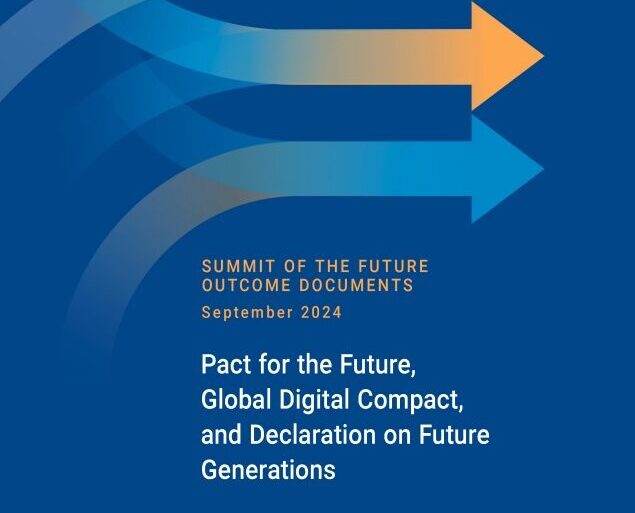The United Nations recently concluded the Summit of the Future, gathering world leaders, government representatives and civil society organisations to tackle pressing global issues. A key outcome of this summit was the adoption of the Pact for the Future, a comprehensive plan for international collaboration. At the heart of this pact lies the Global Digital Compact, a framework designed to guide digital cooperation and the responsible use of artificial intelligence (AI) in the years to come.
Key pillars of the Global Digital Compact
The Global Digital Compact establishes a series of objectives, principles, commitments and actions designed to realise a digital future that is inclusive, open, sustainable, fair, safe, and secure for all. It recognises the immense potential of digital technologies and AI while emphasising the need for robust international collaboration to ensure that these advancements benefit all of humanity.
1. Bridging the digital divide
The compact aims to achieve universal internet access by 2030. This ambitious goal will be pursued through strategic investments in digital infrastructure, with a particular focus on underserved areas. Efforts will be made to improve both the quality and affordability of connectivity. The compact emphasizes the importance of strong partnerships, including involvement from the private sector, to ensure meaningful internet access. Additionally, it commits to enhancing digital literacy through national strategies, improving access to digital public goods and infrastructure, and promoting gender equality in digital spaces. These initiatives collectively aim to create an inclusive and equitable digital future for all.
2. Expanding inclusion in the digital economy
By 2030, the compact seeks to create an accessible and beneficial digital economy for everyone. This will be achieved by ensuring equitable access to digital technologies and developing supportive legal and regulatory frameworks. The compact outlines plans to support the digital transformation of small enterprises and provide technical assistance to developing countries. It also emphasizes the importance of knowledge-sharing and technology transfer, while encouraging innovation among underrepresented groups. A key focus is placed on ensuring the safe and resilient functioning of digital systems, which is crucial for building trust in the digital economy.
3. Fostering an inclusive, open, safe and secure digital space
The compact commits to upholding human rights in the digital realm by ensuring compliance with international human rights law throughout the lifecycle of digital technologies. By 2030, it aims to align national legislation with international law and establish safeguards against human rights abuses online. Special attention is given to protecting children’s rights and maintaining the free flow of information. The compact advocates for open and secure internet governance through multi-stakeholder cooperation, aiming to prevent internet fragmentation and avoid internet shutdowns. It recognizes the urgent need to address online violence, hate speech, misinformation, cyberbullying, and child exploitation by creating a safe online environment with common standards. Furthermore, it seeks to promote information integrity by combating misinformation and disinformation, implementing digital literacy curricula, strengthening independent media, and ensuring access to accurate information.
4. Advancing responsible, equitable and interoperable data governance
The compact commits to establishing responsible and interoperable data governance frameworks by 2030. Recognizing the risks associated with increased data collection and processing, it aims to strengthen data privacy and security while maximizing the benefits of data use. Commitments include drawing on international guidelines for privacy protection, empowering individuals to control their data, ensuring safe and proportionate data practices, and developing skilled workforces in data handling. The compact also focuses on closing data divides by developing common data standards, enabling open data initiatives, and increasing financing for data and statistics. It emphasises international cooperation to facilitate secure cross-border data flows and promote equitable, interoperable data governance worldwide.
5. Enhancing International Governance of AI
The compact commits to advancing international governance of artificial intelligence through a balanced, inclusive, and risk-based approach. It proposes establishing an Independent International Scientific Panel on AI within the UN and initiating a Global Dialogue on AI Governance. These initiatives will assess AI’s future implications, promote interoperability of governance approaches, build AI capacities in developing countries, and promote transparency, accountability, and human oversight of AI systems. The compact also calls on standards organizations to develop AI standards that uphold safety, reliability, sustainability, and human rights. By involving all stakeholders and representing all countries, especially developing nations, the compact aims to harness AI’s benefits while mitigating risks in compliance with international law.
Why the Global Digital Compact matters
The adoption of the Global Digital Compact marks the beginning of a new era of international cooperation on digital technologies and AI. Its success hinges on the active engagement of all stakeholders, including governments, private sector entities, civil society, and international organisations.
To ensure the compact’s effectiveness, the UN has committed to monitoring progress on the commitments outlined in the compact and convening regular high-level reviews to assess implementation and impact.
